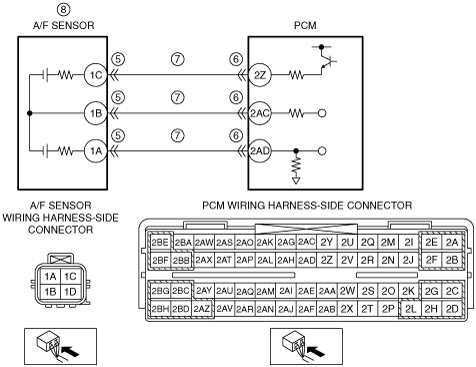|
1
|
IDENTIFY TRIGGER DTC FOR FREEZE FRAME DATA (MODE 2)
• Perform the Freeze Frame PID Data Access Procedure.
• Is the DTC P0132:00 on FREEZE FRAME DATA (Mode 2)?
|
Yes
|
Go to the next step.
|
|
No
|
Go to the troubleshooting procedure for DTC on FREEZE FRAME DATA (Mode 2).
|
|
2
|
VERIFY FREEZE FRAME DATA (MODE 2)/SNAPSHOT DATA AND DIAGNOSTIC MONITORING TEST RESULTS HAVE BEEN RECORDED
• Have the FREEZE FRAME DATA (Mode 2)/snapshot data and DIAGNOSTIC MONITORING TEST RESULTS (A/F sensor, HO2S related) been recorded?
|
Yes
|
Go to the next step.
|
|
No
|
Record the FREEZE FRAME DATA (Mode 2)/snapshot data and DIAGNOSTIC MONITORING TEST RESULTS on the repair order, then go to the next step.
|
|
3
|
VERIFY RELATED SERVICE INFORMATION AVAILABILITY
• Verify related Service Information availability.
• Is any related Service Information available?
|
Yes
|
Perform repair or diagnosis according to the available Service Information.
• If the vehicle is not repaired, go to the next step.
|
|
No
|
Go to the next step.
|
|
4
|
VERIFY RELATED PENDING CODE AND/OR DTC
• Switch the ignition to off, then to ON (engine off).
• Perform the Pending Trouble Code Access Procedure and DTC Reading Procedure.
• Are any other PENDING CODEs and/or DTCs present?
|
Yes
|
Go to the applicable PENDING CODE or DTC inspection.
|
|
No
|
Go to the next step.
|
|
5
|
INSPECT A/F SENSOR CONNECTOR CONDITION
• Switch the ignition to off.
• Disconnect the A/F sensor connector.
• Inspect for poor connection (such as damaged/pulled-out pins, corrosion).
• Is there any malfunction?
|
Yes
|
Repair or replace the terminal and/or connector, then go to Step 9.
|
|
No
|
Go to the next step.
|
|
6
|
INSPECT PCM CONNECTOR CONDITION
• Disconnect the PCM connector.
• Inspect for poor connection (such as damaged/pulled-out pins, corrosion).
• Is there any malfunction?
|
Yes
|
Repair or replace the terminal and/or connector, then go to Step 9.
|
|
No
|
Go to the next step.
|
|
7
|
INSPECT A/F SENSOR CIRCUIT FOR SHORT TO POWER SUPPLY
• A/F sensor and PCM connectors are disconnected.
• Switch the ignition to ON (engine off).
• Measure the voltage at the following terminals (wiring harness-side):
-
― A/F sensor terminal 1C
― A/F sensor terminal 1B
― A/F sensor terminal 1A
• Is there any voltage?
|
Yes
|
Repair or replace the wiring harness for a possible short to power supply, then go to Step 9.
|
|
No
|
Go to the next step.
|
|
8
|
INSPECT A/F SENSOR
• Reconnect the A/F sensor and PCM connectors.
• Inspect the A/F sensor.
• Is there any malfunction?
|
Yes
|
Replace the A/F sensor, then go to the next step.
|
|
No
|
Intermittent concern exists.
• Perform the “INTERMITTENT CONCERN TROUBLESHOOTING” procedure.
|
|
9
|
VERIFY DTC TROUBLESHOOTING COMPLETED
• Make sure to reconnect all disconnected connectors.
• Clear the DTC from the PCM memory using the M-MDS.
• Perform the KOER self test.
• Is the PENDING CODE for this DTC present?
|
Yes
|
Repeat the inspection from Step 1.
• If the malfunction recurs, replace the PCM.
Go to the next step.
|
|
No
|
Go to the next step.
|
|
10
|
VERIFY AFTER REPAIR PROCEDURE
• Perform the “AFTER REPAIR PROCEDURE”.
• Are any DTCs present?
|
Yes
|
Go to the applicable DTC inspection.
|
|
No
|
DTC troubleshooting completed.
|
